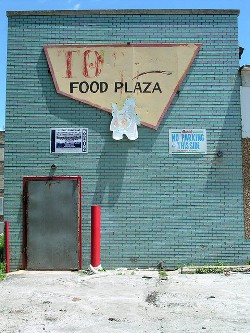Emanuel Administration Plays With Food Desert Numbers
By Chuck Sudo in News on Aug 28, 2013 4:20PM
The Emanuel administration, as it’s wont to do, released a statement to media Tuesday crowing about the many ways the mayor has fought to reduce “food deserts” in Chicago—the areas of the city where residents have little to no access to fresh food, grocery stores or supermarkets. Combating food deserts was one of the foundations of Rahm Emanuel’s 2011 campaign for mayor and the statement released to media was yet another example of the mayor’s philosophy of government by press release.
“Ensuring healthy food access for all Chicagoans is a top priority for my administration. Having access to these food desertdatasets will be beneficial to this initiative, our partners who are engaged in reducing food deserts in the City of Chicago, and our community members.” said Mayor Rahm Emanuel. “This data is critical to continue making progress, and will serve as a source for all those involved in eliminating food deserts to reference, explore and use in the very important work they are doing for our city.”
The statement to media included a lot of bells and whistles in the form of several maps showing the increase in food carts, urban farms and grocery stores in Chicago from June 2011 to current day. The problem here is the Tribune published a story that showed how the Emanuel administration has actually fallen short of many of its promises to make healthy food readily available to those who need it.
Among the findings: 11 vacant lots Emanuel called on grocery store chains to develop remain empty; three of nine Walgreen’s locations that serve fresh fruits and vegetables are not located in food deserts (Emanuel announce Walgreen’s would sell fresh produce at 39 locations); and only four of 17 announced grocery stores have opened in food deserts (two of those were approved by the Daley administration).
In his statement, Emanuel said food deserts decreased by 20 percent. Tribune reporter Bill Ruthhart writes Emanuel aides only focused on the poorest people who live farthest away from supermarkets—less than 25 percent of the estimated 450,000 Chicagoans who are food insecure. Factor that number in and the figure shrinks to 4.7 percent.
The food desert situation reflects a pattern with many of Emanuel's major initiatives: hold a flurry of events on the same topic meant to convey a sense of momentum on an issue and put out numbers that don't always hold up to closer scrutiny. Past reports in the Tribune have shown that dynamic unfolding on the administration's overestimated savings from switching the city's garbage collection system, overstated job creation numbers at his frequent corporate announcements and delayed projects at his Chicago Infrastructure Trust.
Let’s add to that the way Emanuel and Chicago Public Schools consistently spins the longer school day as a “better school day” without any quantifiable proof. It’s something to ponder for those of us who look at the number of protected and buffered bike lanes as proof Emanuel is not like other mayors.
